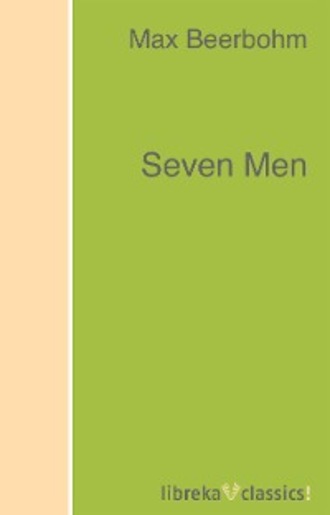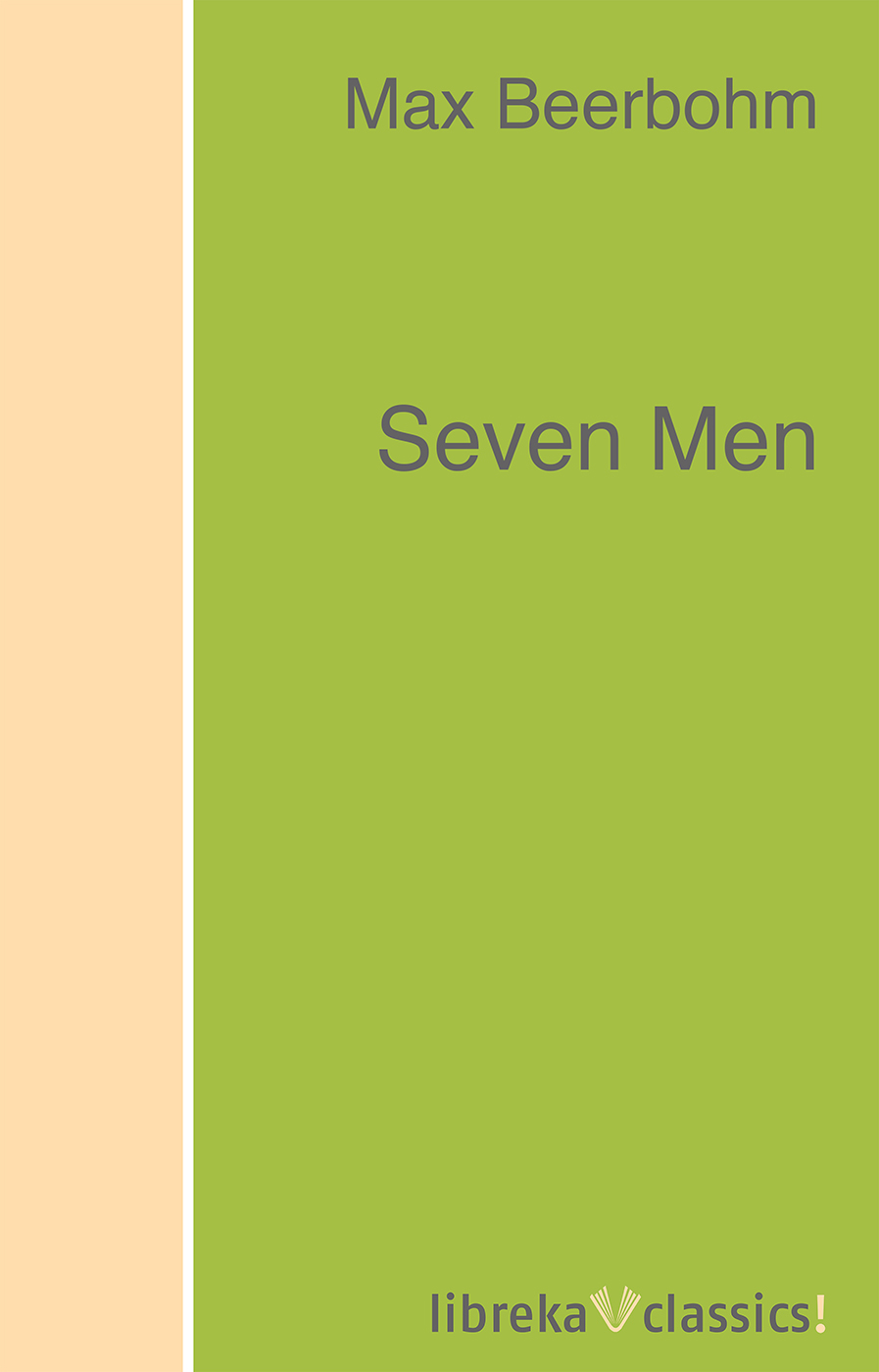
Полная версия
Seven Men


Titel: Seven Men
von William Shakespeare, H. G. Wells, Henry Van Dyke, Thomas Carlyle, Oscar Wilde, Joseph Conrad, Henry James, Anthony Hope, Henry Fielding, Giraldus Cambrensis, Daniel Defoe, Grammaticus Saxo, Edgar Rice Burroughs, Hugh Lofting, Agatha Christie, Sinclair Lewis, Eugène Brieux, Upton Sinclair, Booth Tarkington, Sax Rohmer, Jack London, Anna Katharine Green, Sara Jeannette Duncan, Xenophon, Alexandre Dumas père, John William Draper, Alice Christiana Thompson Meynell, Bram Stoker, Honoré de Balzac, William Congreve, Louis de Rougemont, Nikolai Vasilievich Gogol, Rolf Boldrewood, François Rabelais, Lysander Spooner, B. M. Bower, Henry Rider Haggard, William Hickling Prescott, Lafcadio Hearn, Robert Herrick, Jane Austen, Mark Twain, Mary Roberts Rinehart, Charles Babbage, Kate Douglas Smith Wiggin, Frank L. Packard, George Meredith, John Merle Coulter, Irvin S. Cobb, Edwin Mims, John Tyndall, Various, Charles Darwin, Sidney Lanier, Henry Lawson, Niccolò Machiavelli, George W. Crile, Théophile Gautier, Noah Brooks, James Thomson, Zane Grey, J. M. Synge, Virginia Woolf, Conrad Aiken, Edna St. Vincent Millay, Helen Cody Wetmore, Ayn Rand, Sir Thomas Malory, Gustave Flaubert, Edmond Rostand, Charlotte Brontë, Edith Wharton, Giles Lytton Strachey, Myrtle Reed, Ernest Bramah, Jules Verne, H. L. Mencken, H. Stanley Redgrove, Victor Lefebure, Edna Lyall, John Masefield, Charles Kingsley, Robert Burns, Edgar Lee Masters, Victor [pseud.] Appleton, Ellis Parker Butler, Mary Lamb, Charles Lamb, Johann Wolfgang von Goethe, Kenneth Grahame, Charles Dickens, John Ruskin, John Galt, James J. Davis, Owen Wister, William Blades, Sir Hall Caine, Sir Max Beerbohm
ISBN 978-3-7429-1250-3
Alle Rechte vorbehalten.
Es ist ohne vorherige schriftliche Erlaubnis nicht gestattet, dieses Werk im Ganzen oder in Teilen zu vervielfältigen oder zu veröffentlichen.
SEVEN MEN
by Max Beerbohm
Contents
ENOCH SOAMES HILARY MALTBY AND STEPHEN BRAXTON 'SAVONAROLA' BROWN SAVONAROLAENOCH SOAMES
When a book about the literature of the eighteen-nineties was given by Mr. Holbrook Jackson to the world, I looked eagerly in the index for SOAMES, ENOCH. I had feared he would not be there. He was not there. But everybody else was. Many writers whom I had quite forgotten, or remembered but faintly, lived again for me, they and their work, in Mr. Holbrook Jackson's pages. The book was as thorough as it was brilliantly written. And thus the omission found by me was an all the deadlier record of poor Soames' failure to impress himself on his decade.
I daresay I am the only person who noticed the omission. Soames had failed so piteously as all that! Nor is there a counterpoise in the thought that if he had had some measure of success he might have passed, like those others, out of my mind, to return only at the historian's beck. It is true that had his gifts, such as they were, been acknowledged in his life-time, he would never have made the bargain I saw him make—that strange bargain whose results have kept him always in the foreground of my memory. But it is from those very results that the full piteousness of him glares out.
Not my compassion, however, impels me to write of him. For his sake, poor fellow, I should be inclined to keep my pen out of the ink. It is ill to deride the dead. And how can I write about Enoch Soames without making him ridiculous? Or rather, how am I to hush up the horrid fact that he WAS ridiculous? I shall not be able to do that. Yet, sooner or later, write about him I must. You will see, in due course, that I have no option. And I may as well get the thing done now.
In the Summer Term of '93 a bolt from the blue flashed down on Oxford. It drove deep, it hurtlingly embedded itself in the soil. Dons and undergraduates stood around, rather pale, discussing nothing but it. Whence came it, this meteorite? From Paris. Its name? Will Rothenstein. Its aim? To do a series of twenty-four portraits in lithograph. These were to be published from the Bodley Head, London. The matter was urgent. Already the Warden of A, and the Master of B, and the Regius Professor of C, had meekly 'sat.' Dignified and doddering old men, who had never consented to sit to any one, could not withstand this dynamic little stranger. He did not sue: he invited; he did not invite: he commanded. He was twenty-one years old. He wore spectacles that flashed more than any other pair ever seen. He was a wit. He was brimful of ideas. He knew Whistler. He knew Edmond de Goncourt. He knew every one in Paris. He knew them all by heart. He was Paris in Oxford. It was whispered that, so soon as he had polished off his selection of dons, he was going to include a few undergraduates. It was a proud day for me when I—I—was included. I liked Rothenstein not less than I feared him; and there arose between us a friendship that has grown ever warmer, and been more and more valued by me, with every passing year.
At the end of Term he settled in—or rather, meteoritically into—London. It was to him I owed my first knowledge of that forever enchanting little world-in-itself, Chelsea, and my first acquaintance with Walter Sickert and other august elders who dwelt there. It was Rothenstein that took me to see, in Cambridge Street, Pimlico, a young man whose drawings were already famous among the few—Aubrey Beardsley, by name. With Rothenstein I paid my first visit to the Bodley Head. By him I was inducted into another haunt of intellect and daring, the domino room of the Cafe Royal.
There, on that October evening—there, in that exuberant vista of gilding and crimson velvet set amidst all those opposing mirrors and upholding caryatids, with fumes of tobacco ever rising to the painted and pagan ceiling, and with the hum of presumably cynical conversation broken into so sharply now and again by the clatter of dominoes shuffled on marble tables, I drew a deep breath, and 'This indeed,' said I to myself, 'is life!'
It was the hour before dinner. We drank vermouth. Those who knew Rothenstein were pointing him out to those who knew him only by name. Men were constantly coming in through the swing-doors and wandering slowly up and down in search of vacant tables, or of tables occupied by friends. One of these rovers interested me because I was sure he wanted to catch Rothenstein's eye. He had twice passed our table, with a hesitating look; but Rothenstein, in the thick of a disquisition on Puvis de Chavannes, had not seen him. He was a stooping, shambling person, rather tall, very pale, with longish and brownish hair. He had a thin vague beard—or rather, he had a chin on which a large number of hairs weakly curled and clustered to cover its retreat. He was an odd-looking person; but in the 'nineties odd apparitions were more frequent, I think, than they are now. The young writers of that era—and I was sure this man was a writer—strove earnestly to be distinct in aspect. This man had striven unsuccessfully. He wore a soft black hat of clerical kind but of Bohemian intention, and a grey waterproof cape which, perhaps because it was waterproof, failed to be romantic. I decided that 'dim' was the mot juste for him. I had already essayed to write, and was immensely keen on the mot juste, that Holy Grail of the period.
The dim man was now again approaching our table, and this time he made up his mind to pause in front of it. 'You don't remember me,' he said in a toneless voice.
Rothenstein brightly focussed him. 'Yes, I do,' he replied after a moment, with pride rather than effusion—pride in a retentive memory. 'Edwin Soames.'
'Enoch Soames,' said Enoch.
'Enoch Soames,' repeated Rothenstein in a tone implying that it was enough to have hit on the surname. 'We met in Paris two or three times when you were living there. We met at the Cafe Groche.'
'And I came to your studio once.'
'Oh yes; I was sorry I was out.'
'But you were in. You showed me some of your paintings, you know.... I hear you're in Chelsea now.'
'Yes.'
I almost wondered that Mr. Soames did not, after this monosyllable, pass along. He stood patiently there, rather like a dumb animal, rather like a donkey looking over a gate. A sad figure, his. It occurred to me that 'hungry' was perhaps the mot juste for him; but—hungry for what? He looked as if he had little appetite for anything. I was sorry for him; and Rothenstein, though he had not invited him to Chelsea, did ask him to sit down and have something to drink.
Seated, he was more self-assertive. He flung back the wings of his cape with a gesture which—had not those wings been waterproof—might have seemed to hurl defiance at things in general. And he ordered an absinthe. 'Je me tiens toujours fidele,' he told Rothenstein, 'a la sorciere glauque.'
'It is bad for you,' said Rothenstein dryly.
'Nothing is bad for one,' answered Soames. 'Dans ce monde il n'y a ni de bien ni de mal.'
'Nothing good and nothing bad? How do you mean?'
'I explained it all in the preface to "Negations."'
'"Negations"?'
'Yes; I gave you a copy of it.'
'Oh yes, of course. But did you explain—for instance—that there was no such thing as bad or good grammar?'
'N-no,' said Soames. 'Of course in Art there is the good and the evil. But in Life—no.' He was rolling a cigarette. He had weak white hands, not well washed, and with finger-tips much stained by nicotine. 'In Life there are illusions of good and evil, but'—his voice trailed away to a murmur in which the words 'vieux jeu' and 'rococo' were faintly audible. I think he felt he was not doing himself justice, and feared that Rothenstein was going to point out fallacies. Anyhow, he cleared his throat and said 'Parlons d'autre chose.'
It occurs to you that he was a fool? It didn't to me. I was young, and had not the clarity of judgment that Rothenstein already had. Soames was quite five or six years older than either of us. Also, he had written a book.
It was wonderful to have written a book.
If Rothenstein had not been there, I should have revered Soames. Even as it was, I respected him. And I was very near indeed to reverence when he said he had another book coming out soon. I asked if I might ask what kind of book it was to be.
'My poems,' he answered. Rothenstein asked if this was to be the title of the book. The poet meditated on this suggestion, but said he rather thought of giving the book no title at all. 'If a book is good in itself—' he murmured, waving his cigarette.
Rothenstein objected that absence of title might be bad for the sale of a book. 'If,' he urged, 'I went into a bookseller's and said simply "Have you got?" or "Have you a copy of?" how would they know what I wanted?'
'Oh, of course I should have my name on the cover,' Soames answered earnestly. 'And I rather want,' he added, looking hard at Rothenstein, 'to have a drawing of myself as frontispiece.' Rothenstein admitted that this was a capital idea, and mentioned that he was going into the country and would be there for some time. He then looked at his watch, exclaimed at the hour, paid the waiter, and went away with me to dinner. Soames remained at his post of fidelity to the glaucous witch.
'Why were you so determined not to draw him?' I asked.
'Draw him? Him? How can one draw a man who doesn't exist?'
'He is dim,' I admitted. But my mot juste fell flat. Rothenstein repeated that Soames was non-existent.
Still, Soames had written a book. I asked if Rothenstein had read 'Negations.' He said he had looked into it, 'but,' he added crisply, 'I don't profess to know anything about writing.' A reservation very characteristic of the period! Painters would not then allow that any one outside their own order had a right to any opinion about painting. This law (graven on the tablets brought down by Whistler from the summit of Fujiyama) imposed certain limitations. If other arts than painting were not utterly unintelligible to all but the men who practised them, the law tottered—the Monroe Doctrine, as it were, did not hold good. Therefore no painter would offer an opinion of a book without warning you at any rate that his opinion was worthless. No one is a better judge of literature than Rothenstein; but it wouldn't have done to tell him so in those days; and I knew that I must form an unaided judgment on 'Negations.'


